- Home
- Patrick Robinson
Kilo Class (1998) Page 25
Kilo Class (1998) Read online
Page 25
That evening they stood on deck with many other passengers and watched the distant shores of Lake Ladoga as the ship wended its way to the lake’s north end, where they would stop to see the islands. By 2200 the ship had cut its speed almost to zero for the night.
Tomorrow they would sail close to the islands before turning south, making a slow ninety-mile run down to the estuary of the Svir River. A hundred miles farther up the river would bring them to the port of Voznesene in the southwest corner of Lake Onega. They were scheduled to arrive there in the early morning hours of June 9 and would anchor for the night in the lake’s sheltered southern waters.
They would spend that day running north to the island of Kizhi to see the spectacular wooden churches, and would then steam down to an anchorage among the islands that dominate the central part of the lake north of Petrozavodsk. On the morning of June 10 they would set off for the Green Stop at the northwest corner of Onega.
During this time the four gentlemen from Minnesota quietly made themselves known to a variety of passengers. They never shared their table but would sit up in the little bar at the stern of the ship, sipping coffee and the occasional glass of Armenian brandy, listening appreciatively to the Russian songs that invariably broke out when sufficient vodka had been consumed. They befriended the young blond-haired steward, Pieter, who served during the afternoon and early evening. He liked talking to old Mr. Andrews about the secondhand American car he one day hoped to buy, though Mr. Andrews never seemed to say much himself.
Nurse Dubranin always awakened her men at 0630. She attended to their laundry and organized clean clothes. By 0800 the party from the Midwest had emerged from their two suites for breakfast. June 10, however, was an early morning. All five were out on deck before dawn as they cleared their anchorage off Kurgenicy and set off at a low speed for the main north-south channel, which lay to the northeast. The Captain spent much of the day cruising along the lovely western shoreline, which was dotted with remote farmlands.
In the late morning, the Yuri Andropov began to speed up, running straight for the Green Stop, which she would make by 1830 in the evening. They spotted Captain Volkov’s convoy, at 1252 about a mile ahead, driving slowly along the deep central channel. Traffic on the route had been unusually light during the last few days, but there were still five large freighters trying to pass the Tolkach barges.
The Andropov was not forced to wait in line with the freighters and overhauled the barges effortlessly. Nurse Dubranin and her four employers were out on deck to see the truly astonishing sight of three Kilo Class Russian submarines being carried across the lake and up to the White Sea on the biggest transporters any of the assembled passengers had ever seen.
The ship’s broadcast network pointed out that this was not an unusual sight. The barges were traveling the regular summer route for new Russian Navy ships that had been built, or undergone a refit, in the famous Red Sormovo Yards at Nizhny Novgorod on the Volga River. The Soviet Navy had been using these inland waterways for more than half a century to move warships around. Not, of course, in the winter, the female guide explained, because these northern waters were frozen solid from October to April.
She added that it was a testimony to the immense foresight of the Communist leaders who had constructed these “matchless” throughways, which joined rivers, lakes, and oceans together, through the canals. She also mentioned that the Russian water transport system, engineered for major shipping, was unequaled anywhere in the Western world. She left out the part about the thousands and thousands of deaths that had occurred among the enslaved labor force that built the Berlomorski-Baltic Canal.
The Andropov slipped past the Kilos, and both Mr. Andrews and Mr. Maklov noted the presence of three guards on the barges, all of whom waved cheerfully at the passengers while the Captains sounded the ships’ horns in greeting. Mr. Nichols and Mr. Rabovitz were speechless at the size of the two submarines, each two and a half thousand tons, high on the deck of the nine-hundred-foot Tolkach.
The four men and their nurse spent the afternoon resting. At 1800 they went to watch their final approach to the Green Stop, peering out at the sunlit shore on the port side as the Captain slid up to the jetty, reversed his engines, and came to a halt in the shallows. The waving summer grasses brushed the side of the ship.
Nurse Dubranin walked back to the stern and stared back down the lake, marveling at its translucent light, a light that would scarcely fade throughout the long night ahead, a light that all summer long creates the White Nights up here in the northerly reaches of Russia. Never had she seen such bright water. A group of seagulls swimming on the surface were lit by a light so pure, at an angle so oblique, that the water had turned, literally, into a mirror; the reflections were as sharp and focused as the birds themselves.
She saw that the submarines were left far behind, and she watched the lines being secured before walking back to rejoin her gentlemen—just as the big gangway was lowered out of the hull, across the grass and reeds to form an easy bridge to the dirt road beyond. She could see passengers walking out to investigate the territory. A small army of traders awaited them, their trestle tables set with local wares—filigree silver, wood carvings, jewelry of all types, antiques, little paintings of the area, and pots of jam. Right here was capitalism taking firm roots.
Along the road fifty yards to the left was a small farmhouse, which had been converted into a café-bar. The hand-painted lettering on the sign said: WELCOME INN. And on the timbered counter there were three brass samovars full of steaming tea, plus two large coffeepots, and various bottles of brandy and liqueurs.
Farther along the road at least six buildings were under construction, presumably shops that would cater to the foreigners who were eager to spend money on Russian souvenirs.
The ship’s broadcast system announced that the crew would prepare a barbecue on the shore that evening. Passengers were welcome to picnic or to eat on the ship. There would be a small charge for those wishing to sit at tables set up by local people in the field adjoining the Welcome Inn.
Nurse Dubranin quickly paid ten dollars for a five-dollar table on the edge of the field and placed a reserved sign on it. As her gentlemen prepared to leave the ship at 1930, they took one final walk on deck along the starboard side. They walked more slowly than usual because, less than one mile off their beam slightly for’ard, were the two giant Tolkach freighters, anchored now with their cargo of submarines, lit by the still-bright western sunlight, their hulls stark against the distant horizon. K-6, K-7, and K-8.
Boris Andrews nodded slowly, and the group then walked away without a word, eager now for the grilled steak and baked potato with butter and sour cream that awaited them on shore. They would also be sure to eat plenty of Russian cheese and black bread with hot coffee. For their night would be long.
Dinner was over, but by 2200 the sky was still light above the western flatlands, and the fireball of the sun could still be seen above the endless horizon, casting a pinkish light on the long waters of the lake. The winds were from the southwest, warm and light. Sipping coffee while awaiting the midnight shadows, the little group from the Midwest watched the Russian crew attempt to make money.
Stewards, bearing little envelopes, mingled with the passengers, requesting tips for the less public members of the staff—the cooks, the galley staff, and the maids. The tips were not expected to be high, just a little something, a dollar or so from the wealthy folk from the West for the underprivileged Russian workers. The envelopes would be collected on the way back to the ship. By 2230 Boris had five of them in his pocket.
Fifteen minutes later, with fifty or more passengers still sitting in the warm field, sipping brandy at their tables, Nurse Dubranin rather ostentatiously stood up and announced that she was taking her men for a short evening walk along the dirt road. Then, she added, addressing the people at the next table, an edge of asperity creeping into her voice, that she would insist they go to bed. “They have all drunk quite suff
icient of that brandy, or whatever it is.”
There were two or three cries of “C’mon, Edith, let the guys have a few laughs…they’re on vacation, right?” But the nurse from Chicago was having none of it. She bossily told them to follow her out of the drinking area, and to breathe deeply, especially Mr. Nichols, who occasionally suffered from asthma.
They set off along the road, heading slowly north. Boris Andrews could be seen limping painfully at the rear of the group. “Poor old guy,” said a Texan at the next table. “She shoulda left him alone. He was having a good time.”
It took them more than ten minutes to walk six hundred yards while still in sight of the other passengers. The final two hundred yards along the shallow left-hand curve in the dirt road were completed more quickly. It was still light, and they could see the silhouettes of the Tolkach barges, way out on the water.
Andre Maklov led the way, and he walked carefully along the left-hand side of the road, staring at the trees. He stopped suddenly before the trunk of a big pine. Then he said softly, “Look carefully left, then right, guys.” And all five of them took a hard look around. No sound disturbed the night, not a soul moved anywhere within their vision.
“Okay,” Boris Andrews said very quietly, staring at a small square instrument he had taped inside his guidebook. “This is it. Let’s go.”
He bounded across the grass and slid through the undergrowth into the wood, followed by his three companions. Nurse Dubranin was hurrying along behind them, trying to remove her wig. They moved with swift, sure steps, guided by their leader, who now had his GPS in his hand, leading them to the last way point he’d entered several weeks previously.
It was darker in here than it had been on the road because of the dense foliage above them. But in the gloom of these critical minutes, Messrs. Andrews, Nichols, Maklov, and Rabovitz ceased to exist. And the four US Navy SEALs, looking ridiculous in their old-man disguises, moved swiftly, easing branches and bushes aside as they ran. Edith Dubranin, running fast, with the trained skill of the CIA field officer Angela Rivera, followed in their wake.
They reached the rising ground just below the big straggly bush they sought, and the light appeared brighter in front of them now as the mile-deep wood prepared to give way to open farmland. They arrived, silently, tearing off their disguises with relief, and placed them in a neat pile.
Ray Schaeffer was under the bush like a ground-hog, scrabbling for the shovel, which he found in twenty seconds flat. He and Rick Hunter grabbed the bush and heaved it out of the ground. The Lieutenant Commander ordered young Jason, the late Mr. Rabovitz, to stand guard. “Patrol around us…if you see anyone, warn us with two owl-hoots, and hide. Let him come on in if he must, then take him out with this combat knife, instantly. Right now we have zero margin for error.”
Rick Hunter handed over the knife. “Start digging right there,” he ordered the late asthmatic Sten Nichols, who he now referred to as Harry, “…not deep…the canister doors are right on top, no more than a coupla feet below the surface.”
It took less than five minutes to uncover and open the door. Lieutenant Commander Hunter took charge of the unloading of the first canister, while Petty Officer Harry started digging for canister number two. Inside, Rick found four sets of wet suits carefully packed in sealed plastic bags, each one containing a numbered pair of flippers—the white painted number each SEAL had been awarded on the day he passed his BUD/S course, the number that would follow him throughout his career in the elite Navy corps.
Angela took over now, arranging the packs in a line and then placing on top of each one a SEAL’s Draeger Mk V, the underwater breathing apparatus that leaves no bubbles behind and no noise to betray the presence of the combat swimmers to an alert sentry. The cylinder holds thirteen cubic feet of oxygen at two thousand pounds per square inch. A trained SEAL, breathing steadily, has four hours of air in his Draeger, but stress and adrenaline can empty the oxygen supply in half that time. The equipment is a hefty thirty-five pounds on dry land but is virtually weightless underwater.
Already packed, in with the wet suits, was each SEAL’s modern, commercial scuba-diving mask, which fit perfectly, but such masks are apt to be manufactured in fluorescent greens, oranges, and reds to attract attention. Each SEAL had, naturally, taped or black painted his personal mask, and each one had been carefully checked and wrapped by the instructors back at Coronado.
Beneath the underwater equipment Rick Hunter found four SEALs attack boards—the small, two-handed platforms that contain a compass, depth gauge, and watch right in front of the swimmer’s eyes as he kicks forward. It keeps the swimmer straight and keeps him on time; it helps him check his likely oxygen consumption; and keeps him cool and steady with all the information he needs effortlessly at hand. Two SEALs usually share one board, but Rick Hunter thought they should have one each for this mission, since they would be traveling subsurface all the way there and back, and would have to separate under the barges.
At the bottom of the first canister were two light machine guns—Soviet designed RPD’s, with six ammunition clips each. Rick grunted, as he dug for the door of canister two, “The guns are for Ray and me. There’s gonna be pistols for all five of us.”
The second door came open, and inside there were two old canvas bags containing obvious street clothes for the SEALs—jeans, shirts, and sport jackets, socks and Topsiders. Beneath them were four packages of Semtex explosive, 160 pounds of the stuff grouped into sets of eight charges, each one weighing five pounds, and each with a separate timing device, and a separate magnetic clamp.
Ray had the third canister open by now, and he pulled out more explosives and timers, plus five Sig SAUER 9mm pistols with ammunition clips. There were also five sheathed Kaybar combat knives, and the standard medical and survival supplies, plus ground sheets and ponchos they might need should they have to take to the hills and walk out. On the floor of the canister was a flashlight, a pair of powerful binoculars, ten chocolate bars, and five large bottles of fizzy water. Plus another hunk of Semtex fixed to a wooden board designed as a booby trap, with a battery detonator.
They dumped their disguises into the underground canisters, pulled on their wet suits, and prepared to walk to the lake. They would carry flippers and Draegers by hand, with the two rifles, pistols, knives, and explosives strapped and clipped on their cross belts. It took no more than five minutes for each man to become battle-ready.
Angela cleared up as they went, organizing what was now their home base. The plan had been reviewed over and over. They were to make their way back here afterward and get rid of as much stuff as they could before heading off across the fields to the main road, which ran north-south, one mile to the west. Angela wore a loaded pistol at her side, and a Kaybar handily strapped to her belt close to her right hand. It was agreed that she would make her way to the shore of the lake in one hour and wait on the edge of the wood in case there should be an observant passerby. She knew if someone came along at the wrong time, she would have no option but to kill instantly.
They shook hands silently, and the SEALs set off in the twilight of the wood, arriving at the outer edge of the trees, gazing out from the undergrowth to the still light waters of the lake. It was 0145 exactly. They stood quietly, to make certain the coast was clear, then slipped across the dirt road. Crouching low, they made their way into the long grass that grew in the shallow lake water, listening for any unusual sounds above the sigh of the summer wind in the reeds, and the constant whine of mosquitoes.
But there was something else. Something that sounded like a ship’s engine. They peered out through the bulrushes, looking along to the Andropov, moored with lights blazing a half mile to the south. The sound was nearer now, a steady buzzing from the other direction. This was bad news, and it was arriving at the worst possible time. Jason, unaware, was trying to return Rick Hunter’s sheathed hunting knife, and he tossed it forward to the SEAL leader. But he tossed it too far, and to his horror it missed Rick’s
outstretched hand, hitting the water with a significant splash five feet beyond the edge of the bulrushes where Rick stood.
“Fucking HELL!” snapped Schaeffer. “This is an outboard motor, about fifty yards away. One of the ship’s little inflatables…I guess the one Pieter said he takes passengers out on for a dollar a ride. FUCK. He’s coming this way. THERE’S SOME BASTARD WITH HIM, RICK…he must have seen the knife splash…he can’t miss us. They’ll probably start fishing right here.”
“Get your stuff off,” Lieutenant Commander Hunter snapped immediately. “Stand up and greet them, keep only your knife handy. Get rid of everything else. Jason, get over and help him. Ray…call them over in Russian. Smile and wave.”
The SEAL leader moved forward into deeper water, sliding under the surface with his heavy equipment. The noise of the outboard was louder now, and in the shallows Rick could see that Ray was standing bareheaded in his wet suit, shoulders out of the water.
“Hi there, Pieter,” he called, in the elderly voice of Andre Maklov. “There’s good fish in here. Come and see…help me catch him…we grill for breakfast on the barbecue back there.”
Rick heard the young Russian answer quizzically, in the hesitant words of a man who recognized someone but on the other hand had not seen the person before. “Who’s that, Mr. Maklov? Okay? Where’s Mr. Andrews?”

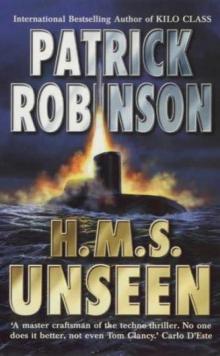 H.M.S. Unseen am-3
H.M.S. Unseen am-3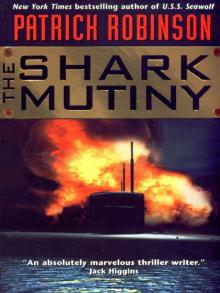 The Shark Mutiny (2001)
The Shark Mutiny (2001)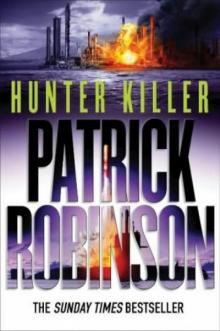 Hunter Killer am-8
Hunter Killer am-8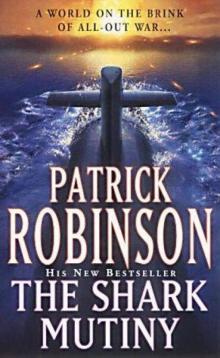 The Shark Mutiny am-5
The Shark Mutiny am-5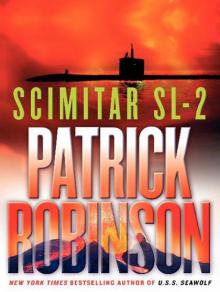 Scimitar SL-2
Scimitar SL-2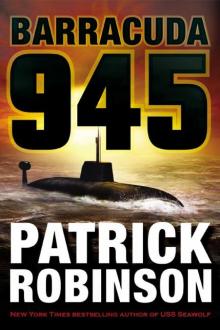 Barracuda 945 am-6
Barracuda 945 am-6 Hunter Killer
Hunter Killer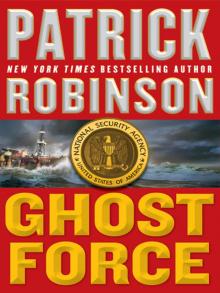 Ghost Force
Ghost Force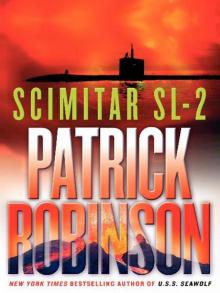 Scimitar SL-2 (2004)
Scimitar SL-2 (2004)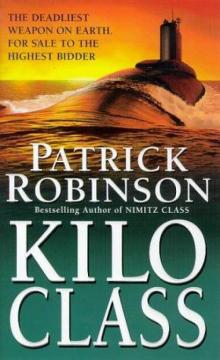 Kilo Class am-2
Kilo Class am-2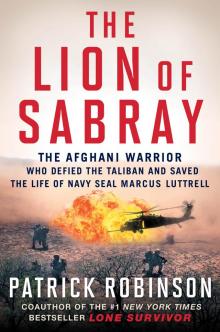 The Lion of Sabray
The Lion of Sabray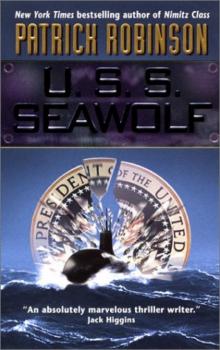 U.S.S. Seawolf am-4
U.S.S. Seawolf am-4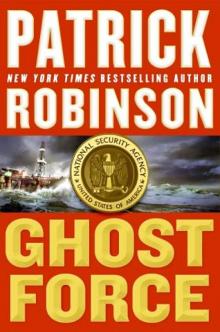 Ghost Force am-9
Ghost Force am-9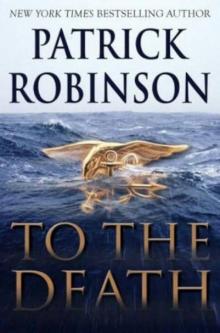 To the Death am-10
To the Death am-10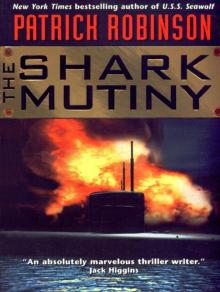 The Shark Mutiny
The Shark Mutiny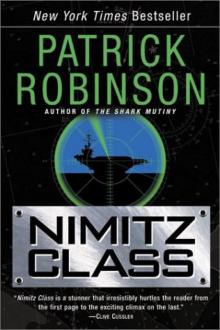 Nimitz Class am-1
Nimitz Class am-1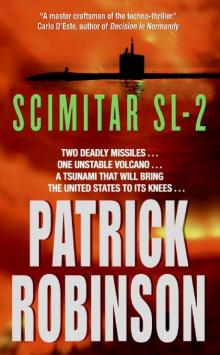 Scimitar SL-2 am-7
Scimitar SL-2 am-7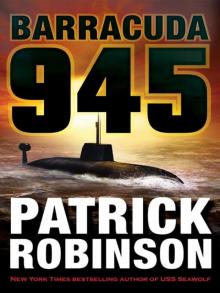 Barracuda 945
Barracuda 945 Intercept
Intercept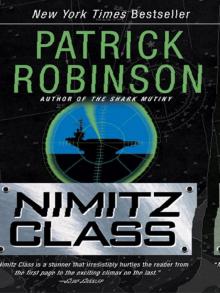 Nimitz Class (1997)
Nimitz Class (1997)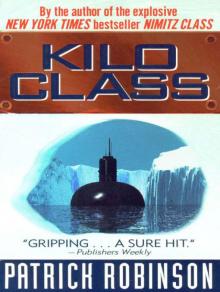 Kilo Class
Kilo Class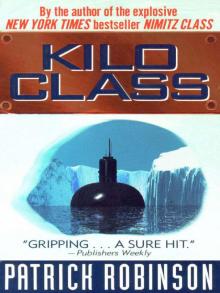 Kilo Class (1998)
Kilo Class (1998) Diamondhead
Diamondhead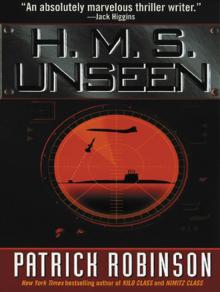 H.M.S. Unseen
H.M.S. Unseen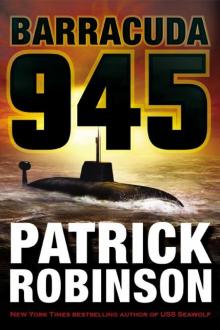 Barracuda 945 (2003)
Barracuda 945 (2003)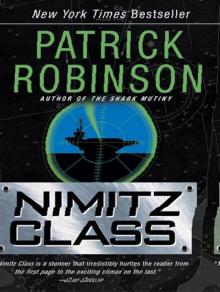 Nimitz Class
Nimitz Class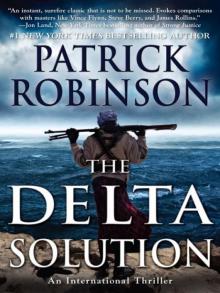 The Delta Solution
The Delta Solution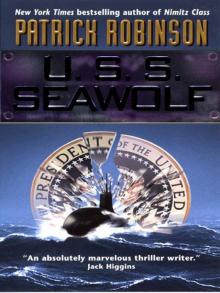 U.S.S. Seawolf
U.S.S. Seawolf